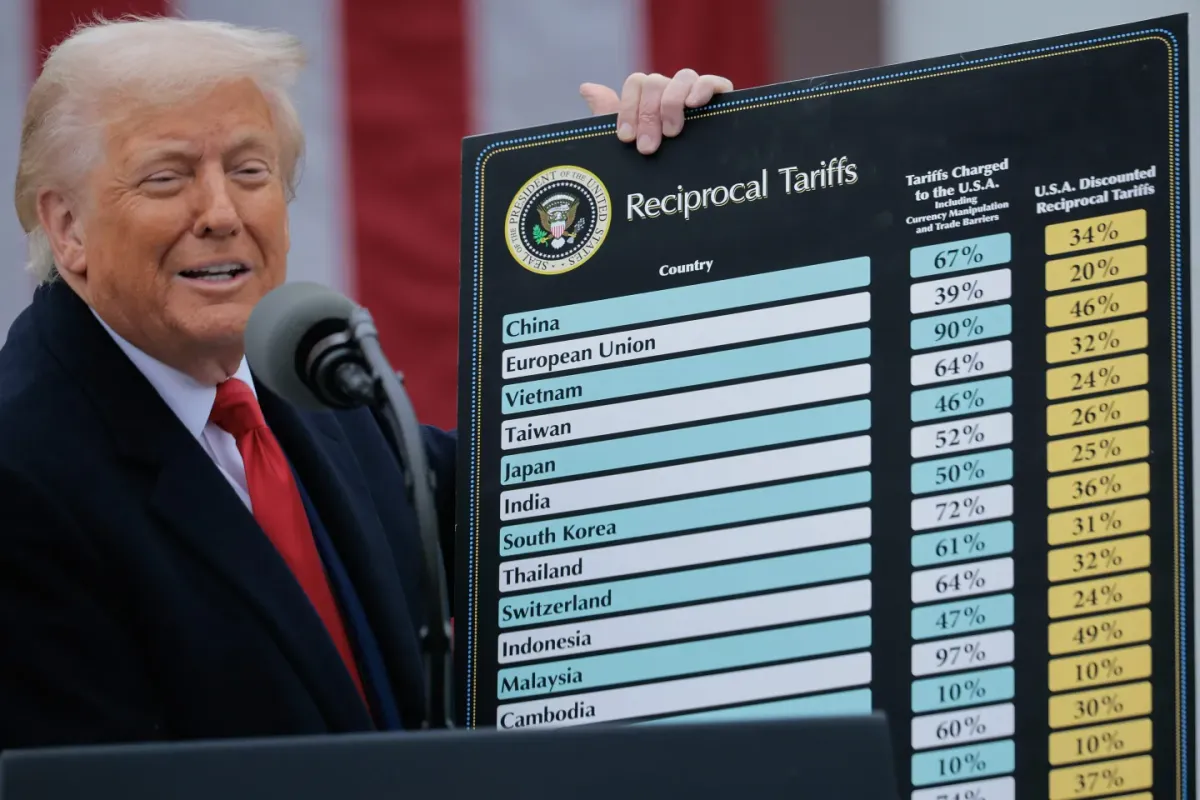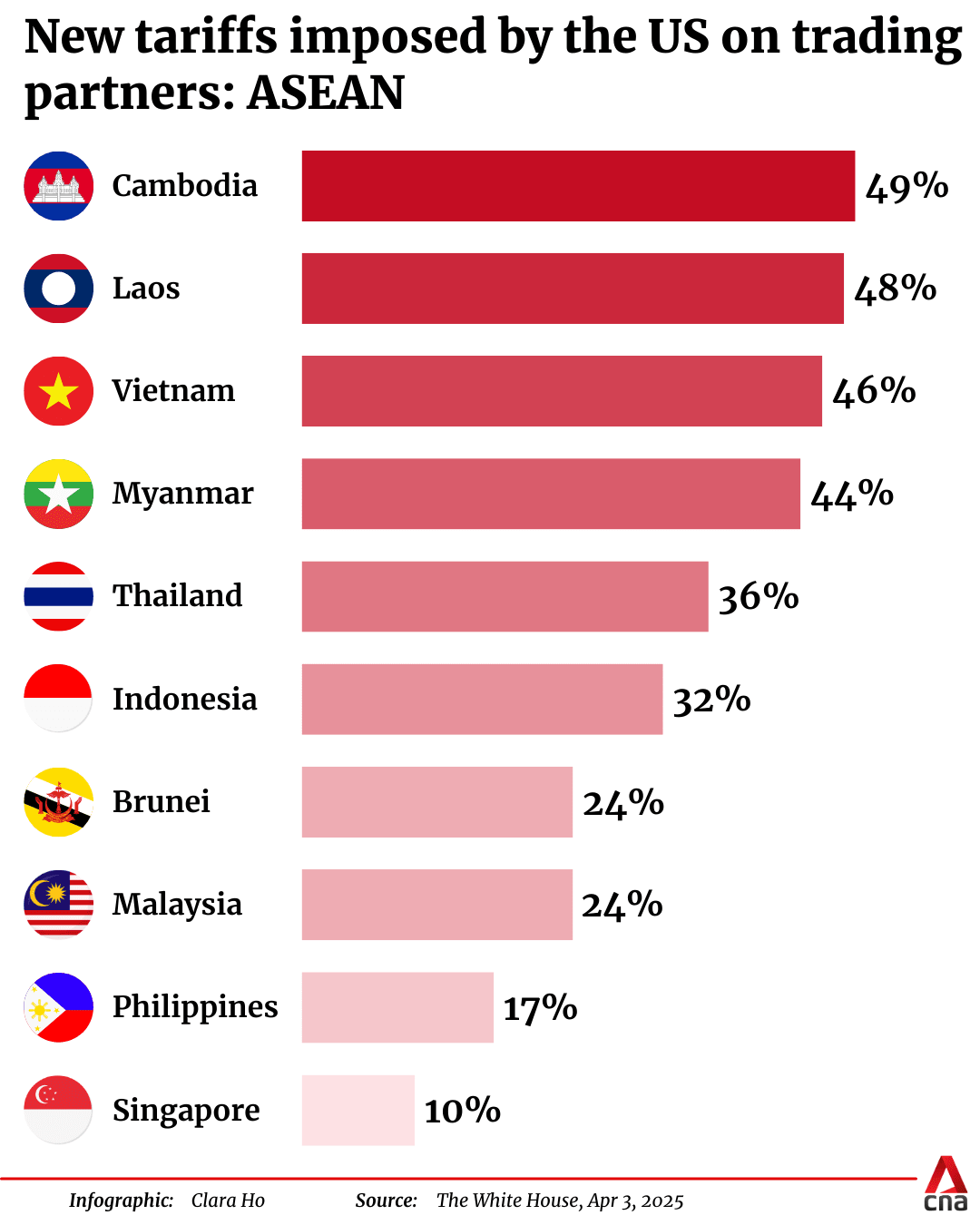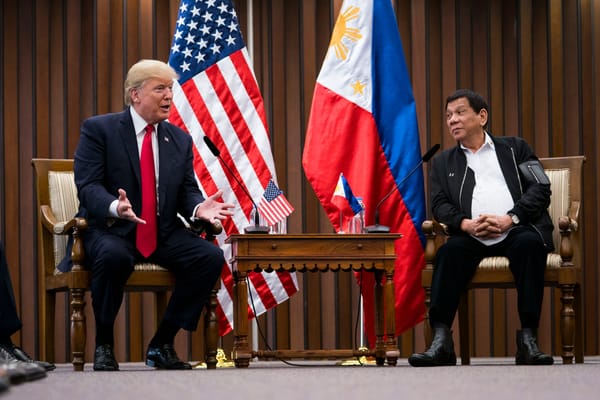Vietnam: from trade war and economics of failure to democratisation

Tariffs: Trump's Act of War
The world's economies are reeling in Trump's fresh rounds of tariffs on all its trading partners. Regardless of being friends and foes, Trump's administration levied 34% on China on top of the existing 24%, 27% on India, 24% on Japan, and 20% on the European Union. The smaller ASEAN economies are among the hardest hit, with up to 49% and 48% in the cases of Cambodia and Vietnam. The day he hailed it was "the liberation day", or "the greatest day in American history," which started to see the industries to boom again, manufacturing jobs returning to American shores. And Trump's tariff imposition is stupidly arbitrary, which is the halving of the trade deficit between the two countries, and even those with whom America has the trade surplus with, such as Australia, is also levied with a baseline of 10%.

In the American context, there is a genuine interest to replace the low-income jobs in the service sectors for some high-skilled, high-paid manufacturing jobs such as design and procurement, but these high-paid manufacturing jobs are often limited and will not be enough to avert the downward trend of manufacturing industries over the recent decades. Moreover, the dream to bring back slews of low-paid manufacturing and low-value assembly lines to American shores is purely a fantasy. An economy of 60,000-dollar mean average income is simply unattainable for manufacturers that are having comforts with low wages and cheap living prices in emerging economies. Tariffs do not prevent the offshoring of manufacturing. In the end, American customers will bear to soaring costs; and on the other end of emerging nations, uncertainty and pain will lead to businesses to downsize their production and job losses that might come with it; and economies start to experience contraction; straining budgets for their much-needed investment plan for the country's infrastructure and future. In short, a madman inflicted pain on both himself and others, and all of us feel the pinch. Trump is declaring a war of madness with the World we wanted to avoid.
Why do trade wars happen?
I would not need to go lengthy to explain how tariffs will be harmful to the global economy. IMF forecasts a universal 10% increase in US tariffs, with this for tats from China and Europe could send the global GDP by roughly 0.5% through 2026, but with this level of tariff, the damage done to the Global Economy could be as great as 1-2% or even worse. But how has it happened?
Remember how Donald Trump won disproportionately against Hillary Clinton in 2016 in manufacturing states. And now he needs to feed something to his voters. The restructuring of the American economy to move from the manufacturing sectors, which found its peak between the 40s and 60s, to a service economy has just brought greater wealth to America. American businesses were happy to move the assembly to China and emerging economies where they could maximise their production and after-tax profits without dealing with stringent compliance standards and trade unions. America is happy to have trade deficits with the world as long as the dollar retains the world's reserve currency and cheap labour and resources are for grabs. American economy has turned into a customer economy, and their customer base allows innovative startups from elsewhere to relocate to America for upscaling and access to the larger market. America's economy did not lose out steam when manufacturing sectors experienced decline, because service and innovations have been just doing so well. It is the only developed economy to experience growth in recent years, and no economy can surpass the GDP of America anytime soon (it is also true that America is shrinking compared to the rest of the world, but multilaterally, the American economy is still a sheer force to be reckoned with).
Furthermore, the growth we might put in the quantification of our GDP quantification by American corporations rather than ours. America reaps the major benefit, leaving us with a meager part. But now, the benefits from globalisation are perceivably unfair among their citizens and segments of society. And they simply shift the blame to us, their hard-working servants. America is taken advantage of not by the World's economies, but by their unequal wealth re-distributions. Now, the perpetrator played victimhood in a recklessly childish manner.
This success does not translate into a public perception of improved social security. American economy is only favourable for the top 1% and top 10%, while the bottom 50% are getting worse off over time, and the once proud and vibrant middle class is likely to experience the stagnation of the working class. To make matters worse, former president Biden promised to build an economy for the middle class, but he struggled to define what the middle class is in the context when the social paradigms have changed a lot since his middle-class childhood. Trump promised a fantasy, yet nostalgic of the manufacturing heyday when people were not necessarily better off, but society was more equal and had no anxiety and fears of social standing loss.
Therefore, to make the readings about how Trump is mad about tariffs, I believe Trump had little to speak to us when he imposed tariffs on our economies; these are for appealing to the voters who voted for him for "taking jobs back", our prestage and social standing. And by going to trade wars with the War, I also think those in Washington for the time being have a strong belief in the weaning American exceptionalism, in which America has a sheer authoritative power to impose their unilateralistic wills on other nation-states notwithstanding the retreat of America.
Vietnam: Tariffs make all things impossible
I want to bring the article back to the discussion of Vietnam, my home country, because I believe a trade war will be an inflection point that signals an end of a wrongly guided economic model, and it will be time for change, more urgently than ever.
Vietnam has been among the "worst perpetrators" of trade deficits the US has with, equal to 25% of our GDP. Prime Minister Pham Minh Chinh ascertained that the GDP target will be maintained despite the 46% tariffs we will bear in April. Last year, they announced a grand plan for public investments from building a cluster of nuclear plants and high-speed railways (over 70 billion dollars). They have of late talked of planning ahead with offshore wind, ports, and other auxiliary infrastructure on top of the current investment in national and provincial highways and Long Thanh International Airport. We heard of some debate relating to SEZs even though it does not appear to be a mainstream policy that they will carry ahead. But where to find the budgets for these projects is still shrouded in uncertainty. It appears to me that the regime leaders are losing their ability to distinguish between facts and fiction.
In a hunger for funds for their new plans of public investment, they are also hit by many problems across the sectors in the economy; a stimulus package of 100 billion dollars has been announced to enable more credit access to rescue the bankers and real estate sector in trouble. If the real estate could not hold out, the bankers would fall. But the economy of real estate (equal to over 20% of our GDP) is also egregiously immoral and problematic; the soaring housing and land prices will only shatter the hopes and dreams of Vietnamese people, but if the prices go down, 20% of our economy will anguish. They also unveiled a plan to pay off the debt to SCB after the fraudulent scandal of Truong Thi Minh Lan, worth 5% of our GDP in the coming years. Certainly, the money mobilised into the economy won't mean to aid the booms of sales and entrepreneurship; it is an attempt to rescue a sinking ship.
But now, the tariffs would make all the grandeur and bragging of these project papers purely a fantasy.
Building strong institutions matters in the face of disruptive change
If trade wars are purely a consequence of American domestic impasse, we have no choice but to bear the brunt. The smaller states could not take retaliatory approaches to America, as any ratcheting-up of the tariffs would cost us dearly. But negotiations with America might not help because Trump proves to be tough about acknowledging his mistakes and backing out. I always talk to my colleagues in Vietnam about how impractical we are to expect to offset over 100 million of the trade deficit with America, which will equal one-quarter of our economy, and any negotiation about trade balance seems unrealistic.
Now, it boils down to our resilience in the face of disruptions. I always believed the totalitarian regime in Vietnam was not standing strong and wouldn't last for long, but these days, they should listen to the takeaways from the Economic Prize in 2024, which drew a correlation between strong institutions and the wealth of a nation. In the face of disruptions, we need strong institutional responses through the democratisation of our politics and the expansion of civil and political rights. The Vietnamese leaders held to a firm belief that they could maneuver in the crisis by their tactics and trying to balance out in international relations. But the nitty-gritty of fighting a crisis in this era is having strong institutions (whether social, economic, and political). With an economy heavily skewed to trade (accounting for 200% of the national GDP), it is virtually impossible to maneuver in the face of trade wars and disruptive supply chains because you have no autonomy over your economy, to simply put.
Now, economies will count on their strong and confident domestic market to avert the crisis. If the disruptions occur elsewhere, at least we could rely on our confident customer base. But Vietnam's domestic market has been so amguishing and squeezed by the decades of low wages and stagnation. And we will seek relief through trade with our trading partners bilaterally or by forming a non-American trading agreement. And yet, Vietnam has been ahereing to a dogma of unilaterialism of smaller authoritarian states in that they insist on their resistance to democracy and universal human values. Oh, come on, we are in a rule-based world where democracy and human rights are universal and seen as a basis for cooperation and integration, and progressive goals and targets must be streamlined into our national plans (including Climate Change, environmental safeguards, rights commitments, labour condition improvement). Despite their amiable language that Vietnam should walk a fine line with global integration and multilateralism, they pay lip service to it. Vietnam has registered lots of FTAs, including the EVFTA, which remains unfunctional due to independent trade unions, which the regime never committed. In my writing in Vietnamese, I pointed to all these matters and that unilateralism (resistance to democracy and human rights in a world where these have been universal values) will undermine the country's capability to engage in global trading agreements and institutions in the years to come.
The story of three economic generations
Back in 1986, when Vietnam adopted the Reform (Đổi Mới), the regime hailed it as a great leap forward. The decades that followed saw Vietnam engage in multilateral organisations from ASEAN (1995), APEC (1998), WTO (2006), TPP (2016 (now CPTPP), EVFTA (2020), etc. The generations during the 80s and all the way to 2010 took on a fight to get out of poverty. From 2010, less than 5% of our population lived in extreme poverty, down from over 70% in 1981. And the fight against poverty has been successfully fought, not thanks to the smart and efficient governance the communist regime never had, but a degree of open-up and integration into the globalisation.

The second economic generation, which emerged after 2010 or the Great Depression, aspired to have a certain degree of economic abundance and social welfare. It means that food affordability would not be a concern for at least our growing urban population; they want to afford spending on vacations, parental leaves, their children's education, their household healthcare, properties, and savings for their comfortable retirements. It was boding well in terms of expectation during the first half of the first decade of the century; however, anxiety and disillusion started to show. Even the new agencies stated that the top 20% of high-income earners found housing more unaffordable, and it would imply that housing will be more inaccessible for the rest of the 80%. Living costs are also soaring due to inflation driven by the government's unbridled public investments and recent stimulus packages to bail out the economy on the verge of collapse. The inflation crisis might get worse if Vietnam tries to devalue the currency to stave off the impacts from tariffs. And they are left to their device to finance healthcare and education, which might take out a quarter of their meager income. Many citizens from this generation are now facing dead-end careers and stagnant salaries, and their future is hanging by a thread. There is a perception that something has gone wrong, just failed to understand what it is.
Now, fighting poverty is not about moving up from the poverty line and the elimination of extreme poverty as modern poverty is multidimensional. The same goes for literacy, not just the ability to read and write but also critical thinking and information processing. Unfortunately, under authoritarianism, we never get these straight. The figures are doctored and tailored to the rulers' intents and purposes.
The third economic generation joined the workforce probably after 2020, They are losing steam and passion for any further efforts, knowing that their efforts are not likely to be paid off. We might talk about the economic crisis that is about to come after decades of corruption and kleptocracy. However, the fatigue experienced by the third generation is likely to make the crisis fall free, and we might not come out of that with monetary policies, bail-outs, or austerity; the crisis might take its course until our country turns into a failed state. To re-electrify the hope and passions of our compatriots, we need a new economic model that empowers them, not just fulfilling the dreams the second economic generation once had, but also guarantees the democratic and human rights that the third generation might need. We need to realise this generation demands human rights, including freedom of speech and expression. They will be more likely to work with creativity and intangible values rather than man labour or manufacturing jobs. They should not be accustomed to getting punished for just expressing their opinions.
The second economic generation might make compromises with rights and freedoms to enjoy a reasonable degree of stability and presume that certainties are there if there is political change. But the third economic generation is different, and the Communist Party will not be able to strip them of the very rights and freedoms, which are not just natural rights but also the means of production of the new generations. And the natural demand of democracy and rights should not necessarily be or read as anti-government. It is the demands of the TIME to come.
Trade War is a nail in the coffin
I always maintain my opposition to tariffs and trade wars, however, we won't be in a position to undo this bonkers policy, although we can focus on how to respond to it. Specifically in Vietnam's context, I see the trade war as a nail in the coffin that seals off the fate of a misguided economic model that has been tried and persisting for a prolonged period of time. The pains of tariffs will render hopeless any attempts of resuscitation and alleviating the crisis. It is an inflictional point that will see the downfall of something that should have fallen long time ago.
There has been a hugely problematic economic model: We see in that the presence of FDI enterprises which flout taxes (64% FDI enterprises reported losses, therefore exempted from taxes they should have paid), carbon emissions 2.5 times greater than the economic growth, and not to mention how our water, and air environment have been heavily polluted; we see in that an economy sustained by low-wage, and living condition, and making precarity worse overtime. We inherited an economy without sovereignty, as it acts like a domain for foreign enterprises to move the goods in and out without making any contributions to our domestic economy, and essentially leaving the domestic enterprises out of the Supply Chains. The Party Secretary To Lam started to mention that growth must go hand in hand with human development, how to move to higher segments of the value chains, and the quality of FDIs. But he's only seen the bits of the matters and no solutions he would have. When he acknowledged the urgency of transformation, he still kept a blind eye on the fact that a wrong economic model is a result of a wrong political model, and democratisation as opposed to authoritarianism, which is the only transformation that is possible to change the course of the current crisis.
The economic crisis is inevitable as it appears at the moment; we are now in it and months from seeing the worse of it. And deep down, we also have a crisis of the future and national fatigue haunting us so badly. The Communist Party had no story or morality for leading Vietnam through the crisis. As a police chief, Mr. To Lam knows more about executing human rights abuses rather than advancing human values, and those who can transform are the true democrats, not the self-proclaimed reformists within the Communist system. And now, Vietnamese people should be clear that our country needs democratisation, which begins with a step to set out the process of democratic transition, followed by continual efforts of building democratic institutions and culture, and advancement of human rights; and we need good economic policies of democratisation and modernisation which focuses on fostering creativity and market economy; economic and demographical re-distributions through the decentralisation of power; fighting corruption and money influence from politics through nurturing a parliamentary democracy, and proving a sense of story and patriotism in our economy for a common dream jointly desired by Vietnamese people through national reconciliation and pluralism. Vietnam is at a crossroads, and now we have to fight with whatever it takes to secure a place for our future in the new era.
.





